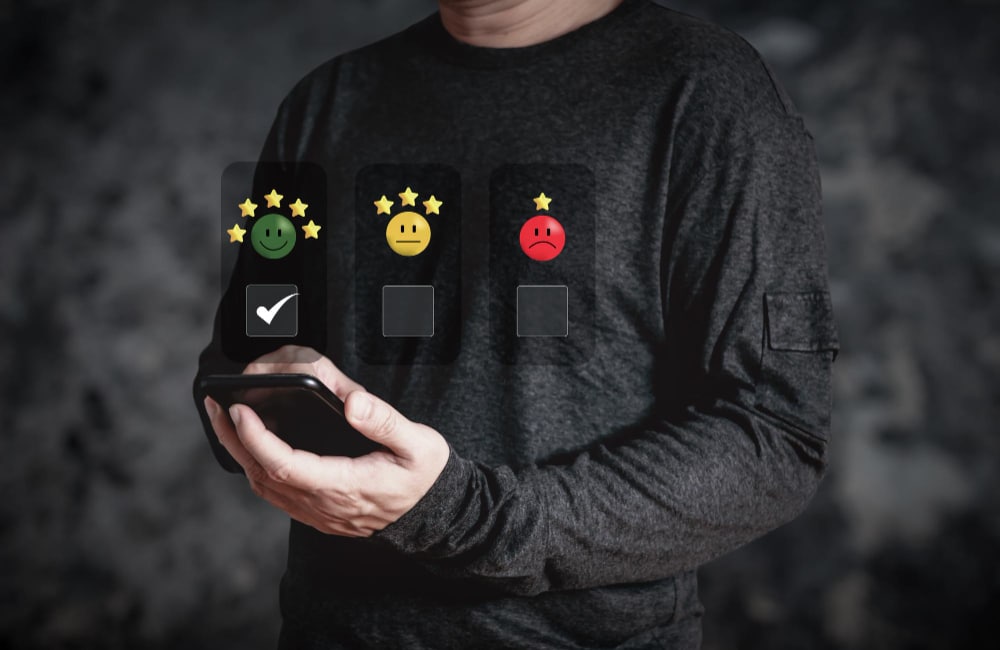In an increasingly competitive market, the corporate reputation has become a determining factor for the success of organizations. Evaluating how a company is perceived by its customers, employees and partners makes it possible to identify strengths, weaknesses and opportunities to improve its image.
This article explores the most effective methods for measuring the reputation of companiesThe course will analyze both traditional and modern tools. In addition, key strategies to manage and protect the corporate image will be highlighted.
What is corporate reputation and why is it important?

The corporate reputation is a reflection of the perception that different stakeholders have of a company. It goes beyond the quality of its products or services, encompassing aspects such as business ethics, social commitment and transparency in communication.
A business with a positive reputation not only attracts more customers, but also generates confidence among investors, retains talent and strengthens its relationships with strategic partners. Conversely, a poor reputation can severely affect profitability and growth, even when products or services are of high quality.
In addition, the brand reputation directly influences purchasing decisions. Recent studies show that more than 90 % of consumers research online reviews before making a purchase, making constant monitoring of public perception essential.
Key factors influencing business perception
The perception of a company is influenced by several factors that must be analyzed in order to maintain a solid corporate image. Among the most important are:
- Brand recognition: It is the ability of a company to be identified and remembered by consumers. A recognized brand is usually associated with reliability and prestige.
- Online reviews and ratings: Reviews on platforms such as Google My Business, Trustpilot or social networks have a great impact. Negative comments can seriously affect reputation, while positive ones reinforce trust.
- Corporate Social Responsibility (CSR): Companies with clear sustainability and social commitment policies tend to have a better reputation. Actions such as donations, volunteering and sustainable practices improve public perception.
- Internal relations: Reputation depends not only on external perception, but also on how employees view the company. A good work culture contributes to projecting a positive image to the outside world.
Traditional methods for assessing reputation

Evaluate the corporate reputation has been, for decades, a task based on traditional tools that are still useful to obtain relevant information.
One of the most common methods is the performance of surveys and interviews with customers, employees and other stakeholders. These tools make it possible to measure satisfaction and the general perception of the company.
Another classic technique is the analysis of the Net Promoter Score (NPS)which measures the likelihood that a customer will recommend the company to others. A high score reflects a positive reputation, while a low value may indicate problems that require immediate attention.
The following are also used market research to assess brand positioning against the competition. These studies are often complemented by the analysis of online reviews and comments on social networks, which provides a broader view of public perception.
Indicators for measuring company reputation
To obtain accurate results by measuring the reputation of companiesIn order to achieve this, it is essential to use key indicators. Some of the most relevant ones include:
- Consumer confidence: Evaluates how customers perceive the company's honesty and transparency. It is measured through surveys and behavioral analysis in social networks.
- Media coverage: Analyze the frequency and tone in which the company is mentioned in the media. Positive mentions reinforce reputation, while negative mentions may require crisis management strategies.
- Customer satisfaction: It is measured through ratings, online comments and satisfaction surveys. Tools such as Google Reviews are especially useful for this analysis.
- Impact on social networks: Examines the number of mentions, interactions and comments received on platforms such as Facebook, Twitter and Instagram.
- Social responsibility and sustainability: Evaluates the compliance with corporate social responsibility and the environmental impact of the company's operations.
7 Popularity analysis tools
Nowadays, there are advanced tools specifically designed for analyze the popularity and evaluate the public perception of a company on the Internet. These platforms make it possible to monitor mentions, measure public sentiment and obtain key information to manage the corporate reputation.
The following are the most prominent and effective tools:
1. Google Alerts - Free basic monitoring
Google Alerts is a free and easy-to-use tool for tracing the online reputation through mentions of a company, product or specific keyword.
Main characteristics:
- E-mail notifications when new mentions are detected.
- Real-time monitoring of news, blogs and forums.
- Customized configuration for key terms and alert frequency.
Advantages:
- It is free and easy to set up.
- Useful for monitoring brand-related keywords.
- Ideal for small businesses or independent professionals.
Limitations:
- It does not include sentiment analysis or advanced metrics.
- It does not analyze social networks, only content indexed by Google.

Leading your reputation with AI
Discover how to revolutionize the management of your corporate reputation with ENIGMIA. Our advanced Artificial Intelligence platform offers you total control in real time, analyzing 100% of the news on TV, Radio, Press and more than one million global media. Evaluate your image, compare with the competition and measure the impact of each communication action. Take advantage of evidence-based AI and take your brand to the next level.
Brandwatch - Advanced analysis of social networks and media
Brandwatch is a robust platform specialized in social media monitoring and sentiment analysis.
Main characteristics:
- Detailed analysis of mentions in social networks, blogs, forums and news.
- Evaluation of the associated sentiment (positive, negative or neutral).
- Identification of trends, hashtags and emerging keywords.
- Segmentation by location, language and demographics.
Advantages:
- Ideal for large companies that need real-time analysis.
- Customized reports and interactive dashboards.
- Integration with other marketing platforms.
Limitations:
- Its cost can be high for small companies.
- It requires time to set up and take advantage of all its functions.
3. Hootsuite - Management and monitoring of social networks
Hootsuite is a popular platform for scheduling posts and monitoring social media presence.
Main characteristics:
- Track mentions, hashtags and comments on platforms such as Facebook, Instagram, Twitter and LinkedIn.
- Programming and publication of content.
- Performance analysis of social campaigns.
- Integration with other tools such as Google Analytics.
Advantages:
- Easy to use, ideal for small and medium-sized companies.
- Allows you to manage multiple accounts from a single panel.
- Good balance between free features and premium plans.
Limitations:
- It focuses on social networks, so it does not cover other digital media such as news or blogs.
- Its advanced analysis capabilities are limited compared to more specialized platforms.
4. Meltwater - Traditional and digital media monitoring
Meltwater stands out for offering comprehensive media monitoring, including print, television, radio and digital platforms.
Main characteristics:
- Tracking mentions in more than 200,000 online news sources.
- Real-time sentiment analysis.
- Tracking of key influencers and journalists.
- Creation of customized reports with advanced metrics.
Advantages:
- Extensive coverage in traditional and digital media.
- Focused on public relations and crisis management.
- Advanced reporting options to measure return on investment (ROI).
Limitations:
- It can be costly for small companies.
- Its focus is more public relations oriented than social networking.
5. Talkwalker - In-depth analysis of social networks and trends
Talkwalker is a powerful platform for social network monitoring and analysis, with advanced artificial intelligence capabilities.
Main characteristics:
- Analysis of mentions in more than 150 million sources, including social networks, blogs and forums.
- Trend identification and predictive analysis.
- Evaluation of visual content (images and videos) to identify logos and brands.
- Automatic and customizable reports.
Advantages:
- Excellent for trend analysis and crisis detection.
- Detailed evaluation of public perception.
- Ability to track mentions in multiple languages.
Limitations:
- High price for small companies.
- Initial learning curve to handle all its functions.
6. Mention - Real-time analysis of mentions
Mention is a flexible and easy-to-use tool to monitor mentions in real time on social networks, blogs and news.
Main characteristics:
- Tracking mentions in more than one billion online sources.
- Sentiment analysis and customized alerts.
- Monitoring in multiple languages and localizations.
- Export of reports in PDF and Excel formats.
Advantages:
- Fast setup and ease of use.
- Ideal for small and medium-sized companies.
- Affordable price compared to other advanced tools.
Limitations:
- Limited functions for predictive and visual analysis.
- It may fall short for companies with complex monitoring needs.
7. ReviewTrackers - Management of customer reviews and opinions
ReviewTrackers is designed to collect and analyze online reviews on platforms such as Google, Yelp and TripAdvisor.
Main characteristics:
- Real-time analysis of comments and ratings.
- Detection of patterns in positive or negative opinions.
- Integration with digital marketing tools.
- Automatic and personalized responses for reviews.
Advantages:
- Focused specifically on reviews and customer satisfaction.
- Ideal for companies focused on improving their local reputation.
- Intuitive and easy-to-use interface.
Limitations:
- It does not offer in-depth analysis in the media or social networks.
- Mainly useful for physical stores and local services.
Strategies to improve and protect corporate image

Once the reputation has been assessed, it is essential to implement strategies to maintain or improve it.
The transparency and proactive communication is key to building trust. Responding quickly and professionally to negative comments can turn criticism into an opportunity to improve public perception.
It is also advisable to establish corporate social responsibility programs. These actions not only benefit society, but also reinforce the company's positive image.
Finally, having a plan for crisis management allows you to act quickly in critical situations. Anticipating problems and managing communication effectively helps minimize reputational damage.
Measuring and managing corporate reputation is essential to remain competitive in a demanding market. Applying traditional methods and modern tools allows obtaining accurate information to strengthen the corporate image.
So, if you have already made up your mind and are looking for advanced solutions to monitor and improve your reputation in real time, discover the tools based on Artificial Intelligence from ENIGMIA where it will help you transform the way you manage the perception of your company.





